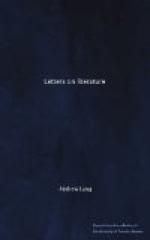“The accent of our own country dwells in our hearts as well as on our tongues.” Ah! never may I lose the Border accent! “Love’s Miracle! To cure a coquette.” “Most honest women are tired of their task,” says this unbeliever. And the others? Are they never aweary? The Duke is his own best critic after all, when he says: “The greatest fault of a penetrating wit is going beyond the mark.” Beyond the mark he frequently goes, but not when he says that we come as fresh hands to each new epoch of life, and often want experience for all our years. How hard it was to begin to be middle-aged! Shall we find old age easier if ever we come to its threshold? Perhaps, and Death perhaps the easiest of all. Nor let me forget, it will be long before you have occasion to remember, that “vivacity which grows with age is not far from folly.”
OF VERS DE SOCIETE
To Mr. Gifted Hopkins.
My Dear Hopkins,—The verses which you have sent me, with a request “to get published in some magazine,” I now return to you. If you are anxious that they should be published, send them to an editor yourself. If he likes them he will accept them from you. If he does not like them, why should he like them because they are forwarded by me? His only motive would be an aversion to disobliging a confrere, and why should I put him in such an unpleasant position?
But this is a very boorish way of thanking you for the premiere representation of your little poem. “To Delia in Girton” you call it, “recommending her to avoid the Muses, and seek the society of the Graces and Loves.” An old-fashioned preamble, and of the lengthiest, and how do you go on?—
Golden hair is fairy gold,
Fairy gold that
cannot stay,
Turns to leaflets green and cold,
At the ending
of the day!
Laurel-leaves
the Muses may
Twine about your golden head.
Will the crown
reward you, say,
When the fairy gold is fled?
Daphne was a maid unwise—
Shun the laurel,
seek the rose;
Azure, lovely in the skies,
Shines less gracious
in the hose!
Don’t you think, dear Hopkins, that this allusion to bas-bleus, if not indelicate, is a little rococo, and out of date? Editors will think so, I fear. Besides, I don’t like “Fairy gold that cannot stay.” If Fairy Gold were a horse, it would be all very well to write that it “cannot stay.” ’Tis the style of the stable, unsuited to songs of the salon.




